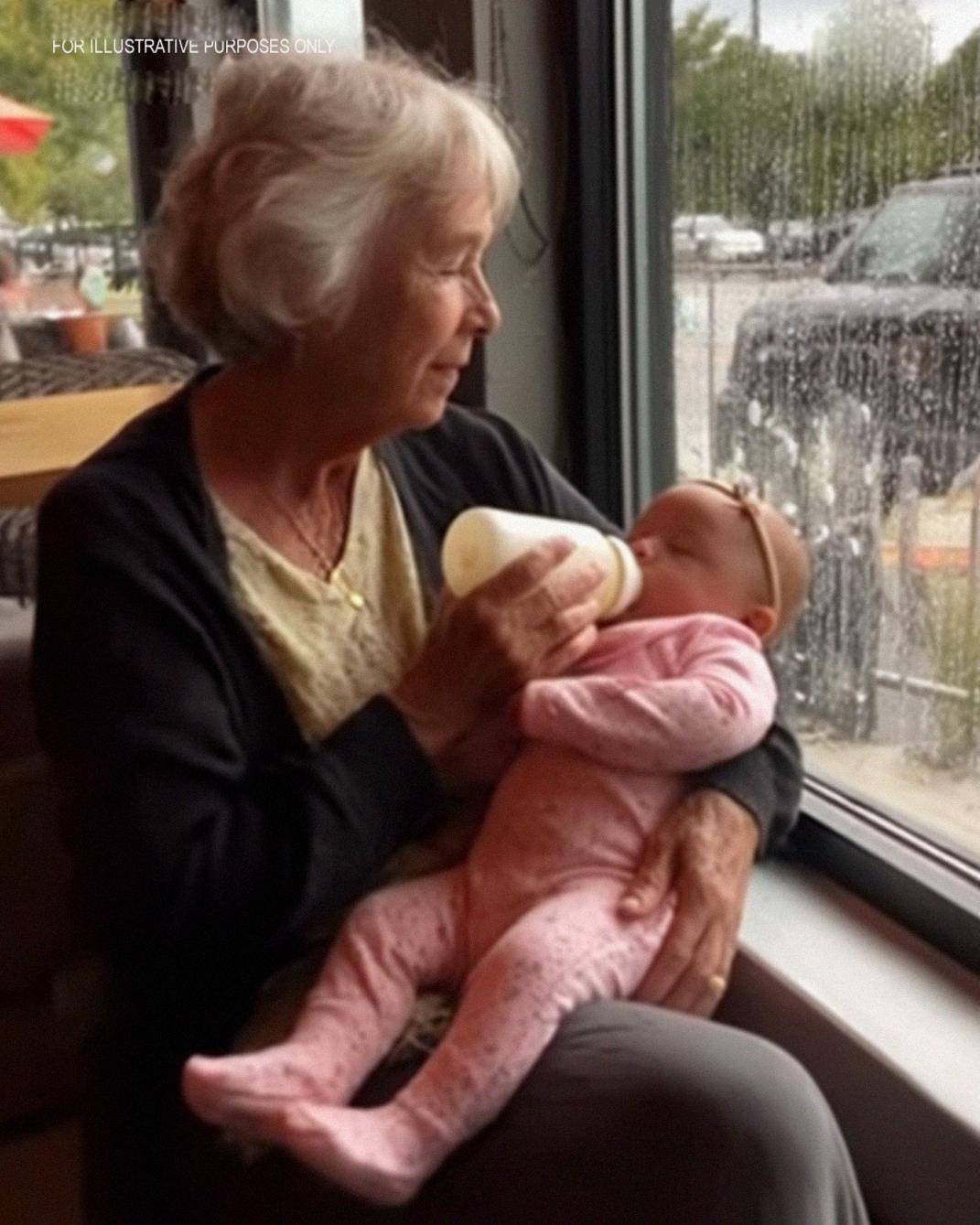When I went to a café to feed my granddaughter and escape the rain, a few rude strangers made us feel unwelcome. Someone even called the police, and a few days later, the story appeared in the local newspaper.
I had Sarah when I was 40—my wonder child, my only daughter. Sarah grew up polite, intelligent, and lively. She had her first child at 31, but tragically, she passed away during childbirth last year. She never got the chance to hold her daughter.
Since then, I’ve become little Amy’s sole guardian, after her father left because he couldn’t handle it. He sends a small monthly check that barely covers diapers.
It’s just me and Amy now. I named her after my own mother. At 72, I’m tired, but Amy only has me.
Yesterday started like any other exhausting day. Amy screamed through her pediatrician’s appointment in a crowded office. When we left, my back ached, and the rain was pouring down.
I ran to a small café across the street, covering Amy’s stroller with my jacket. The place was warm and smelled of coffee and cinnamon rolls. I settled at an empty table by the window and lifted Amy into my arms. “Shh, Grandma’s here, sweetheart,” I whispered as she cried. “A little rain won’t stop us. Soon we’ll be cozy.”
Before I could prepare her bottle, a woman at the next table wrinkled her nose, sniffing like I smelled awful. “This isn’t daycare—ugh. Some of us came to relax, not observe.”
Her words burned. I held Amy closer, trying to ignore them. Then her companion leaned forward.
“Why don’t you take your wailing baby elsewhere? Some of us pay to enjoy peace,” he said sharply.
My throat tightened as other customers stared. I wanted to disappear—but where? Into the rain, carrying Amy and her bottle?
“I… I wasn’t trying to cause trouble,” I said, my voice trembling. “I just needed a place to feed my granddaughter, away from the storm.”
A woman rolled her eyes. “Couldn’t you do that in your car? If your child cries, don’t bring her out.”
Her companion nodded. “Yes, just consider others. Walk outside and return when the baby calms down.”
My hands shook as I got Amy’s bottle from my bag. I hoped her silence would make them leave us alone. I nearly dropped it twice.
Then the waitress arrived—a timid young woman, maybe 22, avoiding eye contact. She shielded us with a tray.
“Ma’am,” she whispered, “maybe it’s better to feed her outside so other customers aren’t disturbed?”
I stared, shocked at their coldness. I used to say, “It takes a village,” and help when people needed it. But where was the humanity now?
“I’m sorry,” I said. “I’ll order something as soon as she’s done.”
Then something strange happened. Amy stopped crying. Her tiny body relaxed, and her eyes widened as if she saw something I couldn’t. She reached her hand toward the door.
I looked up—and saw them. Two rain-soaked police officers entered. The older one was tall, with graying hair and calm eyes; the younger one looked fresh-faced but determined. They scanned the room, then approached me.
“Did we hear correctly? You’re disturbing other customers?” the older officer asked.
“People called the police… on me?” I gasped.
The younger officer explained, “The manager saw us across the street and called. What was happening?”
The waitress gestured toward me, flustered.
“Officers, I only came in to escape the rain,” I said firmly. “I was feeding my granddaughter. She was crying, but she’ll calm with her bottle, I promise.”
“The disturbance was just a baby crying?” the older cop asked.
“Yes,” I nodded.
“You refused to leave when asked?” the younger officer pressed.
“I didn’t cause a scene,” I said. “I told the waitress I’d order something once she settled.”
The manager, Carl, joined in, his face red. “See? She won’t leave, and our customers are furious.”
“Well, not as furious as that hungry baby,” the older cop said, pointing at Amy. The younger cop smiled and extended his hands.
“My sister has three kids—babies are my specialty,” he said.
I handed Amy over, and instantly, she drank her bottle calmly in his arms. “See?” the older cop joked. “‘Disturbance’ over.”
Carl grumbled about café etiquette, but I explained I intended to order. The officers insisted on treating us to three coffees and three slices of apple pie with ice cream. Amy and I sat, enjoying the warmth, while they joined us.
Christopher and Alexander, the officers, were kind and patient. They listened as I briefly told them my story. After pie, they paid the bill and left, but Alexander later sent a photo of me and Amy to his sister, a local reporter.
Three days later, my cousin Elaine called, “Maggie! You’re in the newspapers! Everyone’s talking about your story!”
The café owners fired Carl for his behavior. A new sign appeared: “Welcome Babies. No Purchase Required.” A waitress waved me in and offered pie on the house.
I smiled. Life is meant to be like this. I told her, “Let’s go with pie and ice cream again,” tipping generously, grateful for kindness in a world that sometimes forgets it.
